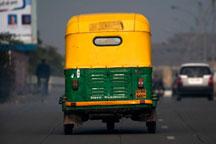Delhi's tuk tuks go through attitude makeover

 0 Comment(s)
0 Comment(s) Print
Print E-mail CNTV, February 26, 2014
E-mail CNTV, February 26, 2014
Three-wheeled auto-rickshaws, popularly known as tuk tuks are the lifeline of the Indian capital. But always blamed for rowdy behavior, drivers have come under criticism especially for their attitude towards female commuters. But now an NGO has taken up the task of providing gender equality awareness to drivers.
These yellow and green three-wheelers literally cover Delhi's roads.
But there drivers are also blamed for misbehaving with women and being rude to commuters. This has become an even bigger issue after the 16th December Delhi Gang Rape.
To make things better, an NGO Manas Foundation, has decided to change this by including gender sensitization in training of these auto drivers.
"The ultimate aim is an attitudinal change towards the needs of women where a person understands that this person could have specific needs and certain behavior is directed towards that. That's the ultimate aim. The challenge is dealing with the social cultural background they have, secondly whatever behavioral activation we try to bring about during this small module of an hour, to sustain it on road," Naveen Kumar, founding trustee of Mansa Foundation, said.
The auto drivers are also being trained to treat passengers better. The team of trainers include psychologists who give interactive lectures by using data on crimes against women.
Mohammad Rafi has been driving a three-wheeler in Delhi for over 20 years, he says commuters were losing trust and in turn auto drivers were losing business and this training will change things though it might take time for attitudes to change.
"There will be a change but it will take time. I am hopeful that my fellow auto drivers will learn from this training and they will also behave properly with out passengers," Rafi said.
The training which is now mandatory, gives the drivers a fitness certificate.
Most Delhi girls like to travel in autos because of its open nature but the Delhi gang rape changed that. They are 100,000 auto drivers on the roads of the Indian capital and sensitizing them would mean sensitizing roads of Delhi.
Though there are 100,000 three-wheelers in Delhi, the number of drivers is over 200,000 who work in shifts. Many of them come from small towns and interiors of India who get a culture shock coming to the Indian capital where women are more mobile and liberal. Interaction with opposite gender in many situations has shown a stark side of violence and lack of sensitivity towards women. Its an attitudinal change that the the Indian capital needs and it will take time before trainings like these start showing results.






Go to Forum >>0 Comment(s)